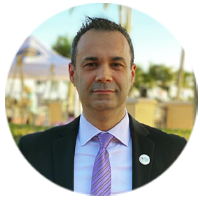
Recently, SIMULIA introduced the 2020 SIMULIA Champions, the inaugural team of brand ambassadors whose expertise and passion position them to advance the future of simulation technology. In this series of blogs, we will be introducing some of our individual SIMULIA Champions, finding out more about their history – and future – with the technology.
Ahmet Becene is a Technical Fellow at Collins Aerospace, a division of Raytheon Technologies, located in Windsor Locks, Connecticut. Coincidentally, he sits next to fellow SIMULIA Champion Feng Feng, whose story you can read here. Collins Aerospace provides solutions for commercial and business aviation, space missions, and military and defense. The company also partners with all aerospace OEMs, and its parent company, Raytheon, is known for state-of-the-art jet engines for civil and military aviation and defense-related technologies.
Becene is part of the structural discipline at Collins, responsible for advancing the company’s simulation capabilities with cutting-edge tools and methods development. He also helps to educate newcomer engineers on how to conduct structural simulations per Collins standards. Abaqus is his primary tool; he uses both Abaqus Standard and Abaqus Explicit for simulations and has been using the software since 1997.
Becene’s professional journey took him through academia before he ended up in industry. He received his Master’s Degree from the University of Maine in 1997, followed by a Ph.D in Mechanical Engineering from the University of Rochester. He was an adjunct professor at the University of Rochester for eight years, and he is inspired by the school’s motto Meliora, which is Latin for “even better” – a motto Becene describes as the foundation of his career as he always strives to be better.
He also worked as an adjunct professor at Rochester University and Yale University, and considers his part in helping hundreds of engineering students to get their degrees to be one of his greatest successes.
“I’ve always firmly believed in transferring knowledge,” he says. “This is something I picked up from my professors while I was getting my degrees – they always instilled in me that you have to transfer knowledge, you can’t keep it to yourself, you have to share it. That’s why I spent so much time in academia.”
On the industry side, Becene’s career has been quite varied, taking him from General Dynamics to General Motors Delphi to Collins. He knew he wanted to be an engineer from childhood, and is inspired and driven by designing and creating things that did not previously exist. He takes many of his engineering cues from nature – a method of design that is known as biomimicry.
“Any load-bearing structure in nature, if you look at it organically, is load-balanced,” Becene explains. “Nature strives to minimize energy usage while maximizing stretch equality all over the structure. I’m fascinated by how trees branch out and how they distribute the load, and also by microscopic organisms called diatoms – their intricate structures and how they filter seawater and load balance their calcium deposits.
“I look at how nature, over millions of years, designs a structure that is minimizing material usage while maximizing strength. Nature has solved all of these loading problems over hundreds of millions of years. As engineers we’ve always been arrogant, thinking we know better – we don’t. It’s much nicer to look at nature and get your cues on how to design structures that carry loads. Biological organisms that use too much material go extinct; survival depends on reducing your material usages to a minimum. Those are the successful creatures, so I copy them. Humankind always tries to copy the birds and swimming creatures. We’re just understanding it better mechanically now, not just copying the shape but the math behind it, and, actually, Abaqus helps me a lot in solving those puzzles.”
In his spare time, Becene has a number of hobbies. He describes himself as a “tinkerer” who needs to keep both his mind and his hands busy, so he enjoys restoring vintage European motorcycles and cars. He also builds vacuum tube amplifiers, using electronics from the 1930s and ‘40s to create amplifiers. While he does not play the guitar, he has a large collection of guitars and amps, which he also likes to give as gifts – a habit that has actually gained him some impressive connections in pop music.
SIMULIA is pleased to welcome Ahmet Becene into the 2020 SIMULIA Champions program and excited to continue working with him in the future. Stay tuned to the blog to learn more about our other 2020 SIMULIA Champions.
SIMULIA offers an advanced simulation product portfolio, including Abaqus, Isight, fe-safe, Tosca, Simpoe-Mold, SIMPACK, CST Studio Suite, XFlow, PowerFLOW and more. The SIMULIA Learning Community is the place to find the latest resources for SIMULIA software and to collaborate with other users. The key that unlocks the door of innovative thinking and knowledge building, the SIMULIA Learning Community provides you with the tools you need to expand your knowledge, whenever and wherever.
